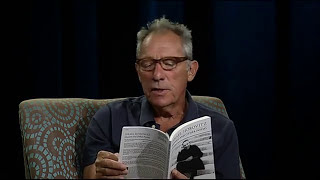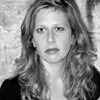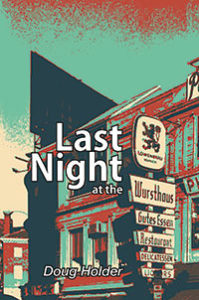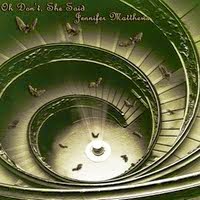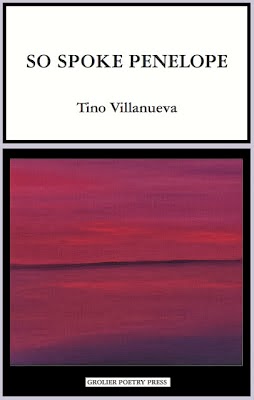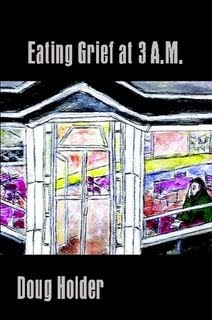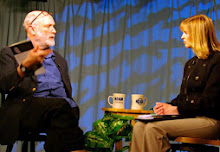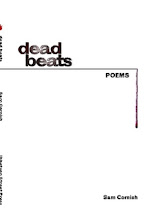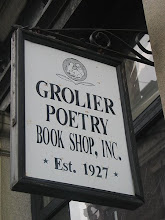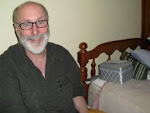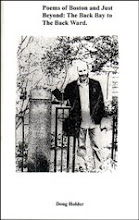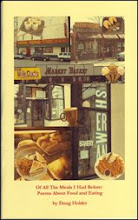What’s Next in Poetry? –a discussion about the future of
poetry, hosted by the Grolier Poetry Bookshop on Friday September 13, with
guests Adam Kirsch, Philip Nikolayev, and Marjorie Perloff.
article by Michael Todd Steffen
Marjorie Perloff, retired Florence Scott Professor of
English Emerita at the University of Southern California, widely known for her
writing on experimental and avant-garde poetry.
Adam Kirsch, senior editor of The New Republic and a
contributing editor to Harvard Magazine,
has been described by John Palattella as
“the offspring of the New Formalists.”
Philip Nikolayev, editor of Fulcrum, an Annual of Poetry
and Esthetics, which has included the poetry of Paul Muldoon, John Kinsella,
Billy Collins and many others.
Maybe the main point about an unrecorded
meet-up in an intimate, iconic space like the Grolier is being there, and the
wisest thing to comment about it: You’d have to be there… The event was
spirited and to the day, and with renowned critic Marjorie Perloff, as well as
her co-panelists Adam Kirsch and Philip Nikolayev, the evening generated vital
ideas on the topic, What’s Next? What’s upcoming, what does the future hold for
poetry?
Some of the main ideas discussed by the
panelists included: How poets evolve from different traditions in poetry to new
voices; how our technical-visual-image oriented culture posed a different
challenge to poets than the book-word oriented culture of the past before
television, movies, pcs, iphones…; what has come to be the standard anecdotal
poem prevalently turned out by MFA writing programs and published in the major
poetry journals; and the terrible difficulty of discerning which poets among
the virtual sea of new emerging poets each year would survive.
On that last topic, Marjorie Perloff
noted that while it’s easy for most commentators and anthologists to agree who
the major Modernist poets are, T.S. Eliot, Ezra Pound, William Carlos Williams,
Marianne Moore, Elizabeth Bishop, agreement on the great voices of the ensuing
generation (the “models” for today’s poets) has been more elusive, while names
like John Ashbury, Frank O’Hara, James Merrill, Robert Duncan, Derek Walcott
and Mary Oliver were brought up. The notion of a central tradition for poetry
in the English language such as the one Eliot established, beaming back through
Tennyson, the Romantics, Pope, Milton and Shakespeare, has given way to a new
stable of potential poets from university programs, most of whom are not even
familiar with Theodore Roethke.
So far, all is well. A grim outlook, with
much to complain about, despair of: these have forever only nourished poets and
their rankling, poetry.
Adam Kirsch notably observed that writing
and reading poetry in our time has been affected by the consumerist tendencies
of the culture. We go through more poetry (that is less carefully written), we
go through it faster, and the poems seem to mean less, they are shelved in
schools for packaging rather than for contention, scrutiny, debate, genuine
dialogue, where wide acceptance of origin is the rule.
Some of the highlight points made by
Philip Nikolayev, after much meandering consideration, paradoxically yet
convincingly in the broad allowance of the discussion were that there remained
a nobility to the expression of true poetry, a challenge of betterment to the
self. At the end of the day among those in the practice of the art, Nikolayev
offered, there were “poets and non-poets,” which drew many silent nods of
acquiescence around the closely felt space in the historic book shop.
Marjorie Perloff engaged the audience in
a more specific, animated, and I think very timely talk about Frank O’Hara’s
book Lunch Poems upon the 50th anniversary of that book’s publication in 1964
by San Francisco’s City Lights Books. Perloff gave extended attention to
O’Hara’s 17-line composition “Poem” (“Lana Turner has collapsed”),
significantly pointing out the very human—“trotting”, rushing to meet somebody,
weather conscious, fallible “I have been to a lot of parties/and acted
perfectly disgraceful”—elements of O’Hara’s language (vernacular) compared to
the remote, very technically neutral and uncompromising voice that dominates
poetry in the journals being published today. Perloff’s tribute to O’Hara
ramified to comments about conceptual poets, using others’ texts in original
arrangements, with a fairly direct critique about how censored and cautious
today’s poets seem compared to O’Hara and on back to Cummings, Pound and Eliot,
the poets who were ready and able to scope out the challenge of their
societies’ ponderous expectations of language and to overthrow those
expectations necessarily to emerge as new meaningful voices. This doesn’t seem
to be happening today, whether due to its failure by the poet at the page or by
editors unwilling to take risks beyond current standards.
One of the hopes offered in the course of
the evening, I thought—and no two accounts of this discussion could possibly be
the same—was Kirsch’s observation that while new scientific (and technological)
breakthroughs supplanted and to an extent obsolesced those of their
predecessors, the cycles of human experience, witnessed especially by poetry,
in the songs of words and their arrangements, although successive and changing,
were renewably meaningful. We still read Homer and Sappho and find much
insight, inspiration and pleasure that cannot be substituted by reading, say,
Robert Pinsky and Louis Gluck, wonderful and plentiful as their poetry is. The
mark of great poets is indelible. Pertinently and plainly, Nikolayev reiterated
that the viable poet of today heading for tomorrow had to be “steeped in
poetry,” a nearly amorphous vast reservoir of the past constantly attracting
addition and alteration.
I think everybody present would want to
join me in thanking the guests for their very considerate thoughts, and to
thank Ifeanyi Menkiti, his wife Carol and Elizabeth Doran for organizing the
event
at the Grolier, “the oldest continuously
run bookshop in the country.”




